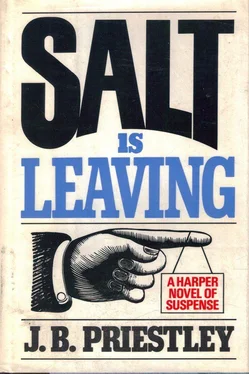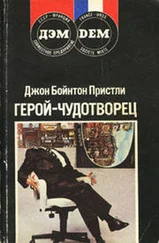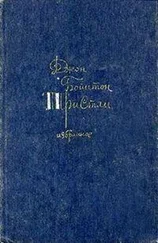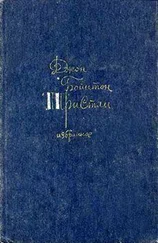Her mother, however, was a fretful woman, full of odd grievances and regrets for a past she had never really had; very much a molehill-into-mountain type. She was capable of nattering away or sulking throughout a meal just because her husband had been five minutes late for it. But now, when they didn't know where he was, probably out of sheer contrariness she refused even to appear vaguely worried.
"I don't know why you"re going on and on about it, Maggie," she had said. "I expect it's some silly business that won't do him or any of us one bit of good. Alan's not bothering. He knows what your father is."
Maggie felt like telling her that Alan didn't know what anybody was, but restrained herself. She might lose her temper; not being able to share her worry and talk it out, she could feel it might be explosive. And if a row started, Alan would go striding off to his books-moths-and-mess room, giving her no chance to explain why she was the worrier for once – though she couldn't really understand it herself – and depriving her of his calm science-don act, which she might need soon. Alan was thirty-three, and four years older than she was, a secretly rather desperate twenty-nine. But because he had taken his degree at Birmingham, and then had only gone to Newcastle for a few years before coming back here, whereas she had spent five years in London and had this tremendous if messy love affair, taking her to all kinds of exciting places he had never seen, she always felt she was much older than he was. In some ways he was just a giant schoolboy. He dressed appallingly and never tried to improve his appearance, which was a pity, because really he was quite handsome in a tall, sombrely dark, Abraham Lincoln kind of way. His mother adored him – she was dark too, though not tall – and talked about him in company as if he might be another Einstein, much to his annoyance, for Alan was a modest fellow. There was no such boosting of her husband's and daughter's abilities. But, then, they were just Culworths, a kind of mistake she had made when she might have done so much better, and they looked rather alike, being shortish and rather squarely built and having the same blunt noses and grey eyes. There were times when Maggie felt she was quite attractive, but there were other times, and now more and more of them, when she was almost sure she was just a thick, dull lump.
As they finished their fruit salad, and after several minutes" silence, Maggie could bear it no longer. "The trouble with this family," she found herself saying, "is that we"re all too dry."
"There's some sherry in the cupboard." This was one of Alan's more maddening tricks, pretending he had just heard a literal statement.
"Don't be idiotic. You know what I mean."
"Well, I don"t." Her mother looked and sounded cross. "And I doubt if you do."
"We"re all too dry. There isn't enough juice in us. That's why nothing happens."
Alan caught her eye and then raised his right eyebrow and lowered his left one, a feat that Maggie had wasted too many years of her childhood trying to copy. "I'm not with you, Mag girl. First you try to spread alarm about our Pa popping off somewhere. Then you complain that nothing happens. Is too much happening or too little?"
"Both," she replied promptly, an old hand now in dealing with Alan's logic-chopping questions. "If anything is happening, then it's the wrong kind of thing. Like me being left with a lot of unsigned cheques and things because Daddy's suddenly vanished. But nothing that we want to happen. And perhaps that's because we"re all dry-"
"It suits me. Most of the types I try to instruct are much too wet."
"I think you"re both being rather silly," their mother told them. "Now about your father-" She hesitated.
Maggie couldn't resist it. "I believe Alan should go to the police."
"The police? You"re out of your mind, Mag. They'd rock round the station laughing at me. Come off it. What's the matter with you tonight?" His tone was still mocking, but the inquiring look he gave her wasn"t.
She shook her head. "Sorry. I don't know why I suggested it. Not sensible, I agree. Forget it."
Their mother was now leaving the table. "I'm going upstairs to look round. You two clear and start washing up." And she left them to it.
As they took the supper things out, they agreed that there should be some coffee but disagreed about who should make it. Alan always said hers was too weak; she thought his too strong. As they prepared to wash up, they went through the coffee argument for about the hundredth time, but there was no passion in the debate. They were like actors waiting for an important scene that had been delayed.
Then their mother appeared in the doorway. She looked triumphant rather than dismayed. "I know what this is all about – your father going off like that. One of you must ring up your Aunt May." Mrs Culworth never trusted herself to make long-distance calls. "I'm sure it's that wretched husband of hers again, in some sort of trouble and expecting your father to get him out of it."
"How do you know all this?" Alan demanded.
Maggie pointed to something her mother was holding. "Is that a note he left for you?"
"If it is, then it's mine, isn't it? And you started fussing before you even looked round-"
"I don't search other people's bedrooms, if that's what you mean," Maggie began angrily.
"Quiet, Mag. Now – Mother?" And Alan gave her an inviting smile.
"Thank you, Alan dear. Well, as soon as I got upstairs I realized he'd taken the smaller case and some things for the night. So that was that. Then I saw this note hanging out of the little box where we keep some money for sudden emergencies. And this is what it says: Have taken ten pounds . Suddenly called away . Explain later ." She looked at Maggie. "Did anybody telephone him at the shop?"
"I was out. But Mrs Chapman said he took a call."
"Then I know exactly what happened. That wretched brother-in-law of his, May's husband, is in trouble again, and she asked him to go at once to Luton. He didn't explain what it was because he didn't like to. He knows I think he's done enough for them, and he promised me he'd say No next time. But of course he's just weak where those two are concerned. Always was. And I've told him over and over again that she's nearly as shiftless as her husband is. She says he drinks , but if you ask me, so does she. Alan, ring them up – the number's in the little book by the telephone – and if your father's still there, say I want to speak to him." She came in to take the towel that Alan had picked up. "Go on, hurry up! Goodness knows what those two might be persuading him to do!"
The telephone was in the sitting room and Alan, being knowledgeable, was no shouter on long-distance, so he was completely out of hearing. Having restrained their curiosity, Maggie and her mother proceeded to wash up in a rather detached and dignified manner, as if they were demonstrators of washing up at an exhibition of detergents. Mrs Culworth, who had detested her sister-in-law for nearly thirty-five years, added a few acid comments on the double-whisky life in Luton, while Maggie used unnecessary force on the little mop thing and said, "Yes, I know" at intervals. She was feeling curiously let-down and depressed.
"Well," Alan began quite cheerfully, "he isn't there. And Aunt May never called him at the shop. And they"re very well, thank you, and Albert is doing quite nicely in the used-car business." And as if to prove that none of this worried him, he began lighting his pipe.
"I knew it," said Maggie.
"What – all of it?" said Alan.
"No, of course not. But I knew somehow he wasn't there."
"All right, then," her mother began angrily, "if you know so much, then just tell me where he is, if he isn't there." She turned to Alan. "Who answered? May, I suppose?"
Читать дальше










